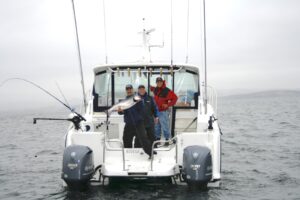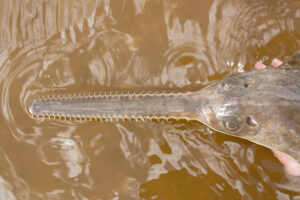
Records are broken all the time. This one was demolished.
Steven Viltoft, of Southport, North Carolina, blew away the state record for common thresher shark with a 589-pound, one-ounce fish caught off Oak Island on January 10. The previous record, set in 2005 out of Oregon Inlet, was a mere 185 pounds.
Viltoft was fishing with Oak Island Fishing Charters for bluefin tuna, using 130-pound line, an 80W Shimano Tiagra reel and a Bazen Custom Rod.
Record Thresher for Dinner
The crew would have preferred to release the thresher, as they have in the past with similarly sized fish, Capt. Wally Trayah said. But by the end of the two-hour fight, it was clear the shark was distressed and unlikely to survive. However, thresher shark is good table fare, so some local folks enjoyed some fresh seafood.
“We passed it out to dozens of people, and everybody was raving about it,” Trayah said. “The local fish house said if he had it on hand, he could sell it for $25 a pound.”
The record fish measured 7.5 feet from nose to tail fork. The distance from its nose to the tip of the thresher’s famously long tail was 13.5 feet. The North Carolina Division of Marine Fisheries announced February 9 that the record had been certified.
World Record Thresher
As big as Viltoft’s thresher was, it still trailed the International Game Fish Association all-tackle record. That fish, which weighed 767 pounds, was caught in New Zealand in 1983. The record thresher in the 130-pound line class was also caught in New Zealand: a 729-pound fish, way back in 1959.
As big as it was—especially in comparison to the state record at the time—Steven Viltoft’s fish was not uncommon along the Carolina coast in winter.
“We see them all the time,” Trayah said. “We’ve released a bunch of them around 500 pounds when we’re tuna fishing. It’s not easy to handle them. If we’re able to let it go, we will let it go.”









